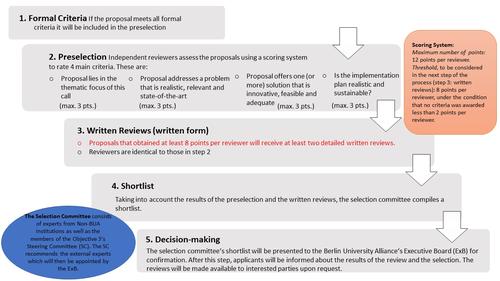FAQs for Open Call: Research Quality and Open Science
Eligible to apply are professors, postdoctoral researchers as well as managerial staff and post-doctoral employees from research-support areas who are employed at one of the Berlin University Alliance’s institutions, Freie Universität Berlin, Humboldt-Universität zu Berlin, Technische Universität Berlin and Charité – Universitätsmedizin Berlin. Applicants must have an employment contract with one of the partner institutions for the complete duration of the requested project.
For applicants employed as WiMis (scientific staff member), the terms of “The Act of Academic Fixed- Term Contract” (Wissenschaftszeitvertragsgesetz, WissZeitVG) apply. Science-Support Staff members are subject to the limitations of the German act on part-time and temporary work (Teilzeitbefristungsgesetz, TzBfG). Fixed-term contracts cannot be issued without reason (“Sachgrund”). Unfounded fixed-term contracts (“sachgrundlose Befristung”) are invalid.
Persons whose positions are to be funded by the project are team members, not applicants. All new positions funded by the project are subject to public calls for application. However, applicants with part-time positions can use project funding to increase their hours, provided that they have an employment contract with one of the institutions’ partners which covers the complete funding period (see also: Who is eligible? And: Do applicants need a permanent contract?). The contractual arrangements are negotiated on an individual basis.
At least two of the four partner institutions of the Berlin University Alliance should be involved in one project. Both (or more) partners can be PIs. Alternatively, one partner can act as a PI while the other one can be integrated as a cooperation partner. The submitting PI needs to enclose an LOI to the proposal (see website for template). The cooperation partner also has to submit a binding LOI of the respective cooperating institution.
Applicants can claim the costs of resources that are not suggested in the template. To do so, applicants fill in the amount in the line “Others” and provide more information under “details”. For example: you would like to claim transcription costs amounting to 1.000 Euro. Furthermore, you need 200 Euro for materials. You thus fill in 1.200 Euro under the heading “Others” and note under “details”: transcription and materials.
Yes. However, the transfer of funds into the next year is only possible for projects with a duration of more than one year and for a maximum of 20% of the year’s total funds (within the project’s duration). The transfer of funds into the next year must be requested until the 1st of September of each year.
Project proposals will first need to satisfy all formal criteria. Proposals that meet all formal requirements will then be presented to a set of (at least two) independent reviewers who assess the proposals with regard to four criteria:
- Does the proposal lie in the thematic focus of this call?
- Does the proposal address a problem that is realistic, relevant and state-of-the-art?
- Does the proposal offer one (or more) solution that is innovative, feasible and adequate?
- Is the implementation plan realistic and sustainable?
All four criteria are assigned a score from 0 to 3 points. Proposals that receive at least 2 points per criterium by each reviewer will receive a written review. Based on these reviews, a selection committee of four external (non-BUA) experts, together with the four members of the steering committee of Objective 3, compile a shortlist, which will in turn be presented to the BUA-Executive Board for final decision-making.
For the calculation of personnel renumeration, please use the rates by the Deutsche Forschungsgemeinschaft (DFG) that you can access via the following link: www.dfg.de/formulare/60_12/

